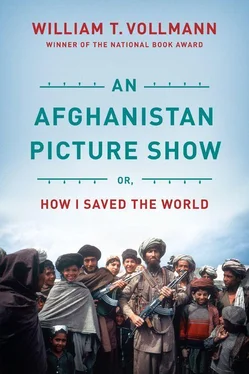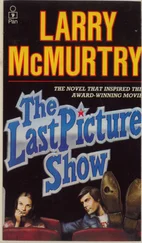BEGGARS AND CHOOSERS [1]
Akbar directed his attention to all the most interesting things: over there, the pillars proclaiming the Islamic virtues of FAITH, UNITY, and DISCIPLINE; over there, the new hospital for tuberculosis patients; then the almost completed Holiday Inn. — “Cal- lif -lif-lif-lif-lif, Ca- lif ton!” called the conductor. — Just ahead, a checkered cab smashed into a donkey. For a moment the great traffic-pulse seemed to miss a beat; and he could hear, as he had early that morning, the songs of tropical birds. — No, perhaps he had imagined the accident, for in less than an instant everything began again, the cab and the donkey going their separate ways; and now came half a dozen embellished rickshaws, nephews or cousins of the one he had ridden, all empty; and an old man dashed across the street, pulling behind him a wheelbarrow full of lemons. — The bus was passing along a wide street, evidently of Empire construction, lined with the canvas lean-tos of clothes vendors. The whining calls of these salesmen stung through the traffic like bees. — The Young Man’s sense of well-being began to dissolve. Everything seemed strange to him; he was so far from home! He dug through the compost layers of his education, looking for familiar correspondences, and though he found them it did not matter in the least. — A leper jumped aboard, moving his silvery cattish head from side to side. He took in the Young Man almost at once. The other men stopped talking, watching to see what would happen. — “He want you give him money,” Akbar said. — “Do I need to?” said the Young Man, wondering if he was being taken advantage of. — “No, no,” said Akbar politely, holding out a few paisa, and the leper took the money without saying anything and jumped off the moving bus…
POST MORTEM
Should I have given the leper money, or did I in fact present an appearance of courageous steadfastness by being selfish? (I should make the record accurate by confessing that I did not in fact come to a decision; in this case, “not to decide was to decide.”) If I was in fact obligated to give him money, should I have also accepted those many services offered to me by the coolies, tour-guides and prostitutes until my money was gone? And if I was obligated to give them money, should I not have been more obligated to give all my money to my poorest neighbors in America? If I’d stayed home, I could have given away the cost of my plane ticket. — But no! How could I have Saved The Afghans then? And, being no longer at home, I had to hoard my money; I did not know how much it would cost to Save Them.
BEGGARS AND CHOOSERS [2]
Clifton was the end of the line. Everybody got off. The Young Man and his companions passed through a British pavilion in memory of Lady So-and-so, and down a long, gentle flight of steps to the beach. It stank there. Akbar and Muhammed Ibrahim stopped so that he could admire everything. A quarter mile out, a twin-masted ship had run aground or been abandoned. The wreck was canted and decaying. To the right, and possibly a bit farther out (it was hard to tell), were a pair of islets, or rather — if one were mean-spirited — rocks. For the sake of saying something, he asked if anyone ever went there. Akbar gave him a look which he thought might be contemptuous. — “Smugglers go there.” —“Oh,” the Young Man said. — Families squatted along the beach, roasting what looked like Indian corn over open fires. On the little bluff between him and the ocean stood the booths of the banana and mango sellers, faithfully attended by swollen flies. Sweat ran down the Young Man’s back.
Akbar insisted that the Young Man have a camel ride. The camel crouched in the warm sand by its master. Its fur was matted with little dried balls of mud or dung where it had rolled on the ground. The Young Man took his pack off and clambered onto the place that Akbar directed, just below the hump. — “You want by yourself, or you lonely?” Akbar said to him. — “Lonely,” the Young Man said, feeling that not to have replied so would have been impolite. — Akbar got on behind him and held on to him tightly. The owner of the camel, a bitter-looking fellow with a mustache, kicked the camel in the throat until it stood up. Then he led it down a path to the waves. Muhammed Ibrahim came smiling behind with the Young Man’s pack. After the camel ride he carried it for the rest of the day, despite the Young Man’s embarrassed protests.
Later they walked along the beach, ignoring the beggars. People approached the Young Man with various commercial offers, but his two guardians motioned them away, until presently no one importuned him anymore. (Nonetheless he knew that the whole mass remained aware of him, that if he were for a moment left to himself, then the consequences would be the same as that morning. He tried to imagine a comparable situation for a foreigner in America — being stuck in the middle of a ten-lane superhighway, maybe. But maybe there was none.)
Akbar and Muhammed Ibrahim invited him to go out wading with them, but he declined, knowing that salt water was bad for his cameras, which he would need to take pictures of famous battles; so his friends went out into the breakers alone and had him take a picture of them.
“You will send to us?” Akbar said.
“Yes, I’ll send it.”
“If you no to send, we will be sad. Very sad.”
“I’ll send it,” he said.
“We will write to you letter. You will please to answer our letter? You will send to us?”
“I’ll send it. Don’t worry.”
They never wrote him later. So he didn’t have their address. So he didn’t send it.
They took him on the merry-go-round, from which he had a whirling view of that tawny, canvas-colored beach whose camels stretched their necks as men led them through the sea shallows, and the low booths of vendors and the cotton-clothed crowds wavered in the hot fog; then the ride was over, and Akbar was offering to buy him one of the toys that were sold in the dirty booths along the beach. — “No, thanks,” he said, feeling embarrassed at all they had already done for him. “Maybe I’ll come back later and buy one.”
“You pick it out, we buy for you now,” said Akbar implacably.
“No, no, some other time.”
“Sure,” said Akbar, insulted. It was the first time that the American had not given in.
They took him to the railroad station an hour before the departure time of his train, the Khyber Mail Express. Akbar went and bought them all glasses of lessee . The guidebook had said to stay away from lessee ; it was a health hazard to Westerners. In the vendor’s stand he could see the big kettle in which the milk fermented. The surface of the scum was black with dead flies. — “Thank you very much,” he said to Akbar, “but maybe—” —“Drink,” said Akbar, bringing the glass against the Young Man’s lip so hard a tooth chipped. — “Okay,” he said. “Thank you very much.”
BEGGARS AND CHOOSERS [3]
While they stood there drinking, Akbar had Muhammed Ibrahim buy the Young Man another packet of betel nuts to chew on his journey. The Young Man wanted to refuse, but Akbar took his hand and closed his fingers around the packet. He thanked them both and stood holding it in his hand, drinking his lessee . — He felt a touch. A girl in a red sari was standing at his shoulder. She smelled like old vomit. — “She want money,” Akbar explained. “She no good.” —He shoved her. She took a few listless steps back, and the Young Man forgot her until he smelled her beside him again. She was looking him full in the face, standing there and saying nothing. — “Should I give her a couple of rupees?” he said, trying to make up for the leper. — “No, no,” said Akbar, irritated. He slapped the young woman’s face and pushed her away again, but without much indignation; it was as if he were brushing a yellowjacket away from a picnic lunch. The girl moved just out of Akbar’s reach and began saying something to the Young Man very dreamily, earnestly, but she could not talk, it seemed, and after a while her lips gave up their slow, silent fluttering. He turned away, but she was still there. If he took out the pouch with his rupees in it, he knew that Akbar would see and be offended; then, too, no doubt everyone else on the street would see, too, and come running. He would give her the packet of betel nuts in his left hand; maybe she could sell it — it must be worth at least a quarter of a cent. The size and shape and color of the packet reminded him of a sealed condom. He felt disgusted with himself and with her. This Afghanistan project, which he had thought to be such a fine self-assertion, had erased every possibility of existence for him except a waxy passivity. — He held out his left hand slightly. Sipping at his lessee , he pretended not to be looking at her. She approached, touched his hand with nervous cunning. He let his fingers begin to open. Akbar was looking at him. He couldn’t let the packet drop to the ground; he had to count on her to take it unseen. Her fingers drummed against the back of his hand; the touch of them was loathsome. She did not understand what he wanted her to do. He opened his fingers a little more, but still she did not understand. Finally she let her hand drop resignedly away from his, and she stepped backwards, still looking at him. — He had finished his lessee . The hand she had touched smelled like vomit.
Читать дальше












